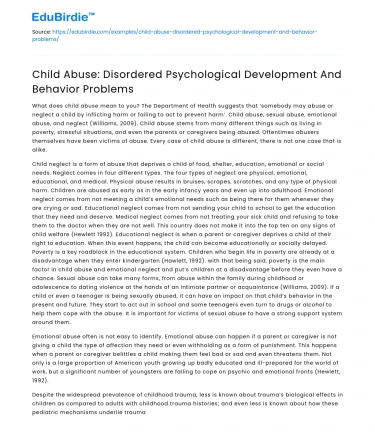Introduction
Child abuse is a grave societal issue that transcends geographical, cultural, and economic boundaries, leaving long-lasting scars on the psychological development of its victims. The maltreatment of children, whether physical, emotional, or sexual, can lead to severe disruptions in their developmental trajectory. According to the World Health Organization (WHO), one in four adults reports having been abused as a child, indicating the pervasive nature of this issue (WHO, 2020). The psychological ramifications of child abuse manifest in myriad ways, from attachment disorders to complex behavioral problems that persist into adulthood. This essay explores the intricate relationship between child abuse and its impact on psychological development and behavior, drawing on empirical research, real-life examples, and expert opinions. By addressing counter-arguments and considering alternative perspectives, this analysis seeks to underscore the necessity for comprehensive interventions and support systems to mitigate the effects of such adverse childhood experiences.
Impact on Psychological Development
Child abuse significantly disrupts the psychological development of victims, often leading to a range of mental health disorders. The early years of childhood are critical for brain development, emotional regulation, and social learning. Abuse during these formative years can alter the brain's structure and function, particularly affecting the amygdala and prefrontal cortex, areas associated with emotional processing and decision-making (Teicher et al., 2003). For example, a study by Teicher and his colleagues found that maltreated children exhibited alterations in brain regions involved in threat detection and emotional regulation, predisposing them to anxiety and depression.
Furthermore, victims of child abuse frequently experience attachment disorders, which can hinder their ability to form healthy interpersonal relationships. The seminal work of Bowlby (1969) on attachment theory elucidates how consistent caregiving is fundamental to developing secure attachments. In contrast, children who suffer abuse often develop disorganized attachment styles, characterized by contradictory behaviors towards caregivers, stemming from fear and confusion. These attachment issues can lead to a cascade of social and emotional difficulties, including trust issues and low self-esteem, which persist into adulthood.
Counter-arguments suggest that resilience factors, such as supportive relationships and personal strengths, can mitigate the negative impacts of abuse. However, while resilience can play a role in recovery, it does not negate the profound effects of early trauma. As Cicchetti and Rogosch (1997) argue, even resilient individuals may exhibit subtler forms of psychopathology. Thus, acknowledging the potential for resilience should not overshadow the need for targeted therapeutic interventions tailored to address the specific developmental disruptions caused by abuse.
Behavioral Problems and Long-term Consequences
The behavioral consequences of child abuse are as varied as they are severe, often manifesting as both internalizing and externalizing problems. Internalizing behaviors, such as withdrawal, anxiety, and depression, are common among abused children, as they internalize their distress and blame themselves for their circumstances. In contrast, externalizing behaviors, including aggression, defiance, and delinquency, reflect an outward expression of unresolved trauma and anger (Kim & Cicchetti, 2004).
For instance, a longitudinal study by Widom (1989) discovered that individuals who experienced abuse or neglect during childhood were significantly more likely to engage in criminal behavior as adults. This correlation highlights the potential for child abuse to set off a trajectory leading to antisocial behavior and encounters with the criminal justice system. Furthermore, the Adverse Childhood Experiences (ACE) study underscores the link between childhood trauma and a host of negative life outcomes, including substance abuse and chronic health conditions (Felitti et al., 1998).
Critics may argue that not all abused children exhibit behavioral problems, citing cases of individuals who achieve successful and well-adjusted lives despite their adverse experiences. While this is true, it is essential to recognize that such outcomes are exceptions rather than the norm. The prevalence of behavioral issues among abuse survivors necessitates a proactive approach to prevention and intervention, emphasizing the importance of early detection and support services. By addressing these behavioral manifestations early, society can help reduce the long-term consequences, ultimately fostering healthier developmental outcomes.
Conclusion
In conclusion, child abuse poses a formidable challenge to the healthy psychological development and behavior of affected individuals. The enduring impact of abuse is evident in the disordered psychological development and complex behavioral issues that survivors often face. While resilience and supportive interventions can mitigate some effects, the profound disruptions caused by early trauma necessitate a comprehensive societal response. By investing in prevention, early intervention, and therapeutic support, it is possible to ameliorate the adverse outcomes of child abuse and promote the well-being of future generations. Ultimately, addressing child abuse requires a multifaceted approach that acknowledges the depth of its impact while striving to create environments where children can thrive free from harm.
Transitioning from discussing psychological development to behavioral problems highlights the interconnected nature of these domains in the context of child abuse. Understanding the psychological foundation is crucial for comprehending the behavioral manifestations that often follow. As we have seen, the consequences of abuse are both profound and far-reaching, affecting individuals at various stages of life. By integrating insights from psychological and behavioral research, we can better appreciate the complexity of child abuse's impact and the urgent need for targeted interventions. This holistic perspective is critical for developing effective strategies to support survivors and prevent future abuse.






 Stuck on your essay?
Stuck on your essay?

